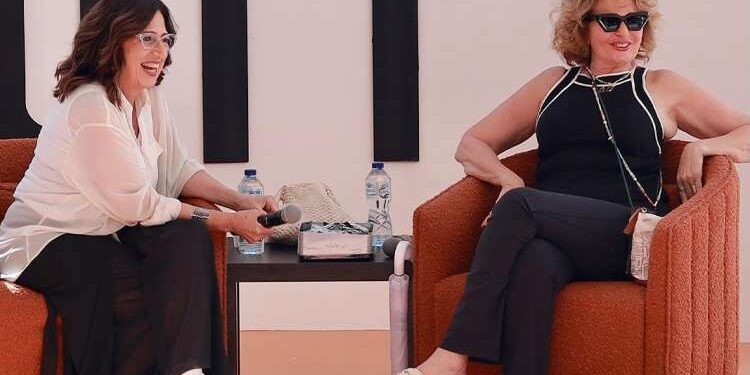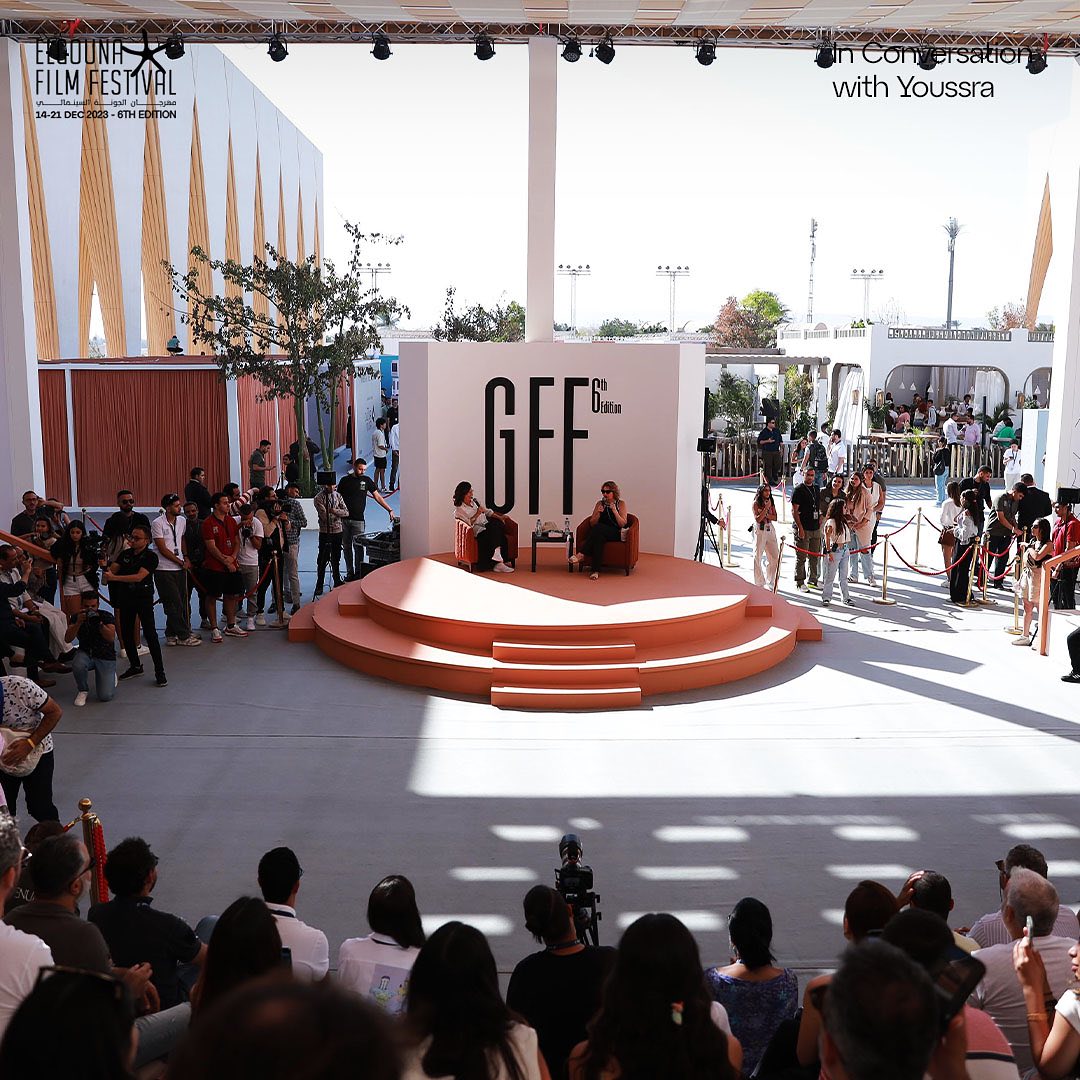The 6th edition of the El Gouna Film Festival, which is held from December 14 to 21, 2023, was illuminated by the radiant presence of the great Egyptian actress Yousra.
The peak of this event was undoubtedly the Master Class offered by this cinema icon, captivating both fans and prestigious guests of the festival, including Yousry Nasrallah, Marwan Hamed, Ines Deghidi, Leila Elwi, Hana Shiha, Salwa Aly, and many others.
An emotional opening in a sensitive current context
From the outset, Yousra anchored her master class in the emotional reality of the moment, highlighting the exceptional edition of the festival in the midst of war in Gaza. Despite the challenges, she pleaded in favor of maintaining the festival to allow the discussion, the debate, and above all to highlight the narrative of the Palestinians through significant films like The sun door (2004) by Yousry Nasrallah.
The pillars of influence: cinematographic reminiscences
The conversation plunged into the key moments of Yousra’s life, revealing the filmmakers who deeply influenced his personal and professional life. Forture meetings with cinema legends, such as Wahid Hamed, Youssef Chahine, Salah Abu Seif, Ahmed Badrakhane and Adel Imam, were shared with touching sincerity.
Among these significant moments, Yousra captivated the public by sharing a memorable anecdote on his first meeting with the Master of Egyptian cinema, Youssef Chahine. This meeting, initially tinged with tension, turned into a memorable collaboration.
Yousra spoke of Youssef Chahine’s initial proposal for the role of the sister in the film HADOTA MASRYA/Memory (1982). However, she had read and reread the script several times without understanding the film, instinctively feeling that she would have preferred to play the role of the wife. Yousra had refused the role at that time because of the scenario she found confused. Without forgetting that the first meeting with Youssef Chahine had been tinged with a certain tension, the director even reproaching the blonde color of Yousra’s hair and its large size.
However, three months later, when she was sleeping quietly with her aunt, Yousra had been suddenly awake by Youssef Chahine himself. He wanted her in his film, but this time for the role of the wife.
This is how they got to know each other and they had worked together for the first time. The scenario that she had not understood at the start had given rise to a film which became a classic of Egyptian cinema, selected at the Venice Festival.
This anecdote illustrated the complexity of relationships in the cinematographic world, where an initial refusal can be transformed into a fruitful collaboration and the creation of a masterpiece.
Behind the scenes of his career: artistic choices with emblematic roles
The behind the scenes of Yousra’s career have been revealed with captivating accounts on how certain roles have been chosen. Moments of meeting with Youssef Chahine to choices of roles with Adel Imam, Yousra shared anecdotes that threw new light on the film creation processes.
Regarding his role in the film Yacoubian building (2006) by Marwan Hamed, Yousra talked about what she considered as a friendly “betrayal”. In reality, Adel Imam invited her to have a coffee, in the presence of the young director preparing his first film. It was there that Adel Imam asked him to accept playing 5 scenes in this new film. Although astonished, Yousra had initially refused. However, Adel Imam had insisted and offered to read the script, which she had finally loved very much. She had therefore worked intensely on the character of Mrs. Christine. Even if she did not appear much in the film, the role was important.
Adel Imam’s friendly betrayal to convince her to accept this role, the fortuitous meetings that have changed the course of her career, all these stories added a human and authentic touch to the Master Class, offering the public a more intimate vision of Yousra’s professional life.
The secret of his longevity: love of work and permanent curiosity
When Marianne surveyed Yousra on her exceptional longevity in the film industry, the answer was both simple and powerful: love of work. Yousra has shared her continuous passion for cinema, her habit of watching many films, and the importance of accepting roles that bring personal growth. A lesson in dedication and permanent curiosity for his job, recalling that passion is the key to long -term success.
Advice for aspiring young people
Yousra shared her own journey, revealing that she had initially dreamed of becoming a doctor until the day she had met Souad Hosny. Her admiration for this actress had been the trigger that had pushed her to become an actress in turn. This childhood dream transition to the realization of his ambition was marked by an innate gift for the imitation and encouragement of his mother and her grandmother.
Yousra’s advice to young actors have been delivered with wisdom accumulated over the years. She highlighted the importance of perseverance in the face of failures, constant passion, and continuous evolution. The passion for the profession is, according to her, the pillar of success and longevity over time. She also stressed the importance of being demanding with oneself, of always wanting to learn and progress. The announcement of an initiative called “Next”, a platform for young cinema aspirants, revealed Yousra’s commitment to the promotion of new talents, adding a philanthropic dimension to its influence in the film industry.
Intimate reflections on life and art
The Master Class has deviated to more intimate territories, exploring love, faith, regrets, and errors. Yousra shared personal experiences, stressing the importance of love in her life and the deep connection with his faith and his total belief in God. She also revealed moments of doubt, bad choices, and the liberating power of self -acceptance. This introspective dive offered the public a more complete vision of Yousra as a person, beyond his status as a cinematographic icon.
Artistic criteria: between confidence and creativity
The discussion ended with an in -depth reflection on the criteria for choosing films, highlighting the need for mutual trust between the actor and the director. Reflections on the scene where, in the film Yacoubian buildingZaky Desouky played by Adel Imam had to declare her love to Christine, embodied by Yousra, illustrated the importance of creativity and collaboration in the artistic process. Yousra told how director Marwan Hamed was kind enough to shoot the scene twice, a first time as planned in the scenario, and a second time according to Yousra’s feeling, to choose one during the assembly. For her, it was proof of mutual trust. The director trusted her and turned a scene by following his advice, and she had trusted her choices during the editing.
A cinematographic and human odyssey overshadowed by a failing moderation
The Master Class of Yousra in El Gouna could have been a captivating experience, offering the public the opportunity to better know the actress and the woman behind the cinema icon. The teachings, reflections, and shared secrets could have created a memorable moment, enriching Yousra’s aura in the world of cinema. However, Marianne Khoury’s moderation unfortunately tarnished this perspective. Despite her position as artistic director of the festival, it was obvious that Marianne Khoury lacked expertise and preparation for moderation. His lack of professionalism, characterized by a deficit of relevant questions likely to arouse real public interest, as well as his frequent interruptions, disturbed the natural course of the conversation, creating frustration in the audience that would have liked to hear the reflections of Yousra more.
Neïla Driss









